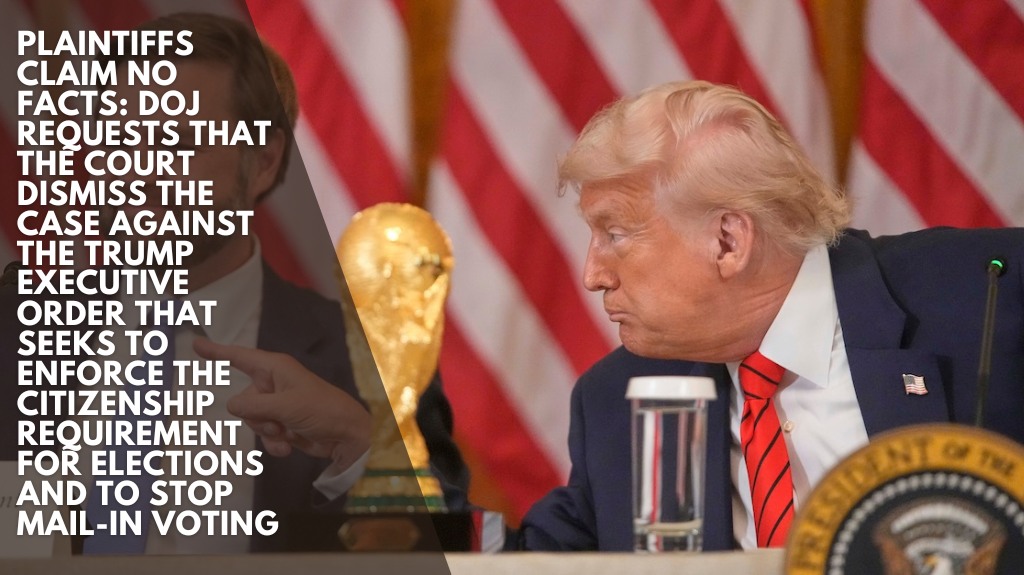The Trump administration is pleading with a federal court to allow the government to proceed with a series of federally enforced changes to some states’ long-standing election laws.
On March 25, President Donald Trump issued Executive Order 14248, which is titled “Preserving and Protecting the Integrity of American Elections.” The order seeks to reshape how elections are administered in the country by, among other things, requiring all voters to prove their citizenship through formal documentation and prohibiting vote-by-mail systems that count ballots postmarked on Election Day but received after that date.
Oregon and Washington, which have used mail-in voting for decades, initially filed for an injunction in early April before moving for partial summary judgment in late May.
Now, the Trump administration is attempting to short-circuit the case in its favor by adopting a different procedural posture.
On Monday, the government filed a 41-page motion to dismiss, claiming that there is no “case” or “controversy” before the district. Rather, according to the US Department of Justice, the states have requested that the judge rule on a “abstract dispute.”
“[T]his Court should dismiss this case without even reaching the merits,” the motion states. “Plaintiffs’ claims also fail on the merits.”
For the majority of the claims raised by the states, the Trump administration’s argument is a time-honored recitation of an analytical framework widely known by legal scholars as “conservative standing doctrine.”
This judicial theory was developed in two cases from the 1920s by conservative judges who sought to limit the use and scope of constitutional redress. In other words, standing doctrine was developed — and has since been honed and upheld — to limit lawsuits against the government.
Standing arguments, while technically procedural, are more fact-intensive than underlying merits arguments in a dispute.
The government claims that the facts alleged by the states do not add up to anything that can be challenged.
According to the Department of Justice, the section of Trump’s executive order dealing with proof of citizenship is currently a form of guidance instructing the Election Assistance Commission (EAC) to “take appropriate action” and begin the rulemaking process. According to the government, the process is still ongoing. And, because there is no actual rule to challenge, the states are filing too early.
“Plaintiffs thus cannot establish the requisite ‘concrete and particularized’ and ‘actual or imminent’ injury in fact for standing purposes,” the complaint requesting dismissal states.
In fact, the government claims that the only action taken toward the “documentary proof of citizenship” portion of the executive order is a letter sent by the EAC to state election officials “seeking ‘consultation’ on the ‘development’ of the federal form” that will be used.
The government claims that the lack of action taken thus far implicates the overlapping legal concept of ripeness, which holds that a lawsuit must challenge something at the appropriate time or it will be deemed premature.
From the motion to dismiss, in length:
While standing seeks to keep federal courts out of disputes involving conjectural injuries, the ripeness doctrine seeks to prevent the adjudication of claims relating to “contingent future events that may not occur as anticipated, or indeed may not occur at all.”
…
Under these circumstances—where an operative rule has not even been proposed, much less promulgated in final form—Plaintiff States cannot establish that [the citizenship section of the executive order] is “fit” for review because future events have not yet occurred and, indeed, they “may not occur as anticipated.” This lack of finality and definiteness counsels against judicial intervention. Since a final rule does not yet exist, Plaintiff States do not yet know how they will be harmed—if at all.
The government largely uses the same standing and ripeness arguments to defend the vote-by-mail section of Trump’s order, which is written to enforce current ballot receipt deadlines.
“What that action will be, how it will be enforced, and against whom is entirely speculative, and is not a basis for Article III standing or ripeness,” according to the motion for dismissal.
“At the outset, the Attorney General has done nothing so far—and so any dispute about what she may do in the future, and whether any such action would violate Plaintiffs’ legal rights, is necessarily speculative.”
The executive order includes additional language aimed at enforcing the directive to require proof of citizenship. The plaintiff states primarily challenge two sections that discuss combing through state voting records and “prioritizing” existing laws that restrict noncitizen voting.
The government dismisses Oregon and Washington’s concerns in strong terms.
“Plaintiffs aver that [the two enforcement sections] will ‘harm Plaintiff States,’ but they do not explain how, when, or why,” the motion continued. “Plaintiffs allege no facts to suggest that DHS or the Attorney General have taken any steps to review State records and do not explain what about either occurrence would harm them.”












